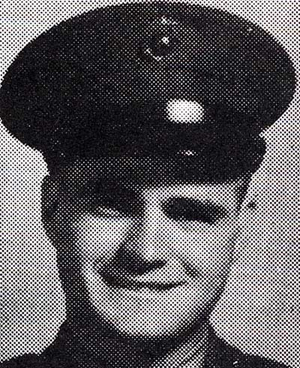
John Gross in New Zealand. Serial # 356609.
Gross, a radioman in H&S 2, was
awarded the Navy Cross for action at Tarawa.
The following information was taken from articles in my dad's scrapbook
and was also sent for inclusion in
Heritage Years: Second Marine Division Commemerative
Anthology.

Lone communications man at central headquarters to maintain contact among our forces during the first 36 hours on Tarawa, PFC John M. Gross faithfully shielded his radio gear against salt water and scathing Jap machine gun fire to get to shore.
Changing boats twice to reach shore, Gross reported to the assault troop commander amid a spray of enemy sniper bullets. The party dodged beneath a pier while proceeding towards the shore, only to find it too low for Gross to extend his antenna.
Disregarding enemy fire that lashed the water in the area, PFC Gross strolled nonchalantly out from under the protecting pier and began signalling other communication hookups ashore. Similar risky gambles kept his radio in continuous operation.
Upon reaching the beach CP site, PFC Gross dropped his load, made a few tests and went into action. Within minutes he had contacted every force on Tarawa, taken over and organized the entire communications hookup of the desperate first 36 hours.
In addition to going without sleep, PFC Gross once chanced enemy fire to collect some batteries on the beach. If he had fallen victim to fatigue or carelessness during those critical hours, troop organization would have been seriously imperiled.
His heroic radio operations also enabled the relay to forward messages to naval batteries supporting the ground troops. Col. Shoup said: " It would be difficult to estimate the outcome if PFC Gross had not come through in such an unfaltering manner."
My dad, PFC Gordon Stevens, relieved Gross at the radio after the first 36 hours.

From Leatherneck early 1944

Shoup's
CP on Red Beach 2.

John Gross after being awarded the Navy Cross for action on Tarawa.
These are some of my dad's thoughts on John Gross:
Gross, as near as I can remember, was the same age (age 23). He enlisted about a week before I did (January 19, 1942) and used to kid kid me about having a lower serial number. John was from Racine, Wisconsin, and worked for an optical company in Milwaukee.
Staff Sergeant Pete Zurlinden, the Marine Correspondent, sent the story of John's citation to both Racine papers and Milwaukee papers. Each town was having a feud on whose favorite son he was. John looked forward to going home and enjoying the publicity. I do not remember what officer wanted to give John the Medal of Honor, but a panel for the Second settled on the Navy Cross. I remember well how nervous John was the morning they awarded him the medal.
John was from a large family but I lost contact with then after his Mother and Father died. The family had John brought back to Racine and they buried him in the hometown cemetary. John was killed by our own rockets fired from a plane on Saipan, along with two other of my buddies. There were other casualties in another outfit, plus some minor wounds among our group. I had written home to John's folks saying he was killed by Jap shellfire but some Marine replacement in our outfit told his folks the truth and they became very bitter about John's death. I visited the folks a number of times amd wrote, but later stopped after his parents died. His brother, Jerome, was in the Army on Saipan and came to see me there.
John was also very serious over a redhead from New Zealand by the name of Alice. I never did hear how she took John's death as her address was in John's effects.

The Three Musketeers
Bob Geil, Gordon Stevens, and John Gross in New Zealand 1943.
Send an Email:
copyright 1999 T.O.T.W.
Created 9 March 1999 - Updated 25 October 2023

Return to Index
Return to Navy Cross Index